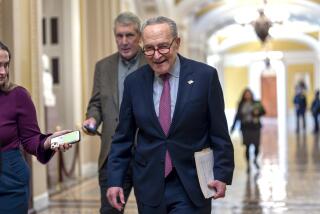Bush Calls for ‘Quick Action’ in Congress
- Share via
WACO, Texas — President Bush previewed his priorities Saturday for the new year, urging Congress to complete work on patients’ rights legislation and to approve bills aimed at stimulating the economy and increasing energy production.
“We must have quick action” on the measures, Bush said in his weekly radio address, complaining that they had “languished” in the Democrat-controlled Senate after passing the Republican-led House.
But demonstrating the difficulty Bush faces, Rep. David E. Bonior (D-Mich.) responded that the bipartisanship that prevailed in Washington after the Sept. 11 terrorist attacks on the World Trade Center and the Pentagon dissolved when Republicans “tried to leave working people behind” in their plan to boost the economy.
Bonior, his party’s No. 2 leader in the House, said Bush and the Democrats failed to reach agreement on an economic stimulus plan because the president favored a bill that was built on corporate tax breaks and lacked sufficient help for unemployed people seeking health care.
Bush, who arrived Wednesday at his ranch near Crawford, used his radio address to summarize the first year of his presidency and to look ahead to the coming months.
“We suffered great loss, and we found a new unity. We were attacked, and we responded swiftly. We have seen the strength of America in countless acts of kindness, compassion and courage,” he said.
Bush said defenses against terrorism now are stronger and air travel is more secure. The administration took such steps “while upholding our constitutional liberties,” he said, a clear reference to criticism that the Justice Department’s terrorism probes have violated some individuals’ rights.
Bush praised Congress for passing two initiatives he stressed as a presidential candidate: a sweeping tax cut and an education reform bill that puts new testing standards on the nation’s public schools.
But he chided the Senate for not passing his economic stimulus proposal, a plan that stalled primarily over health care issues. “I was disappointed by the failure of the Senate to act on my proposals to help laid-off workers and to stimulate job creation,” he said. “I outlined these proposals in October, more than 800,000 lost jobs ago.”
He also complained about Senate inaction on his energy plan, which includes a controversial proposal to drill for oil in Alaska’s Arctic National Wildlife Refuge and a proposal to make it easier for religious-based groups to work with the government to provide social services, which opponents say could jeopardize the constitutional separation of church and state.
Bush called on Congress to adopt what he termed “a solid patients’ bill of rights,” an issue lawmakers have grappled with several times in recent years.
The Senate in June and the House in August passed bills that would provide new protections for millions of Americans in managed health care plans. But the Democrat-backed measure would give patients a greatly expanded ability to sue HMOs, an idea that most Republicans oppose.
After Sept. 11, congressional leaders decided to postpone their negotiations on the differences between the bills until 2002.
In the Democrats’ weekly radio address, Bonior, who is running for governor in Michigan, presented the divisions concerning legislation in stark terms, saying that during periods of war and economic turmoil “it’s working people who take it on the chin. . . . We need to stick by them.”
Singling out tax cuts for business in the Bush-backed economic stimulus plan, Bonior said, “When we grant $25 billion in retroactive tax rebates to big corporations at a time when hundreds of thousands of U.S. workers are being laid off, people are going to stand up and say, ‘This is wrong.’ ”
Bipartisanship breaks down, Bonior said, “when we cater to special interests or corporate greed.”
More to Read
Get the L.A. Times Politics newsletter
Deeply reported insights into legislation, politics and policy from Sacramento, Washington and beyond. In your inbox twice per week.
You may occasionally receive promotional content from the Los Angeles Times.








